区块链学习笔记(二)
Solidity
首先要编写合约那么自然是需要一种编程语言,Solidity是一种基于以太坊的区块链语言,语法类似JavaScript,常用于智能合约的编写。Solidity自然也需要一个编辑器,这里我们使用一个在线IDE——Remix。首先选择Solidity环境,然后左边会多出许多按钮,我们待会儿,将会用到它们
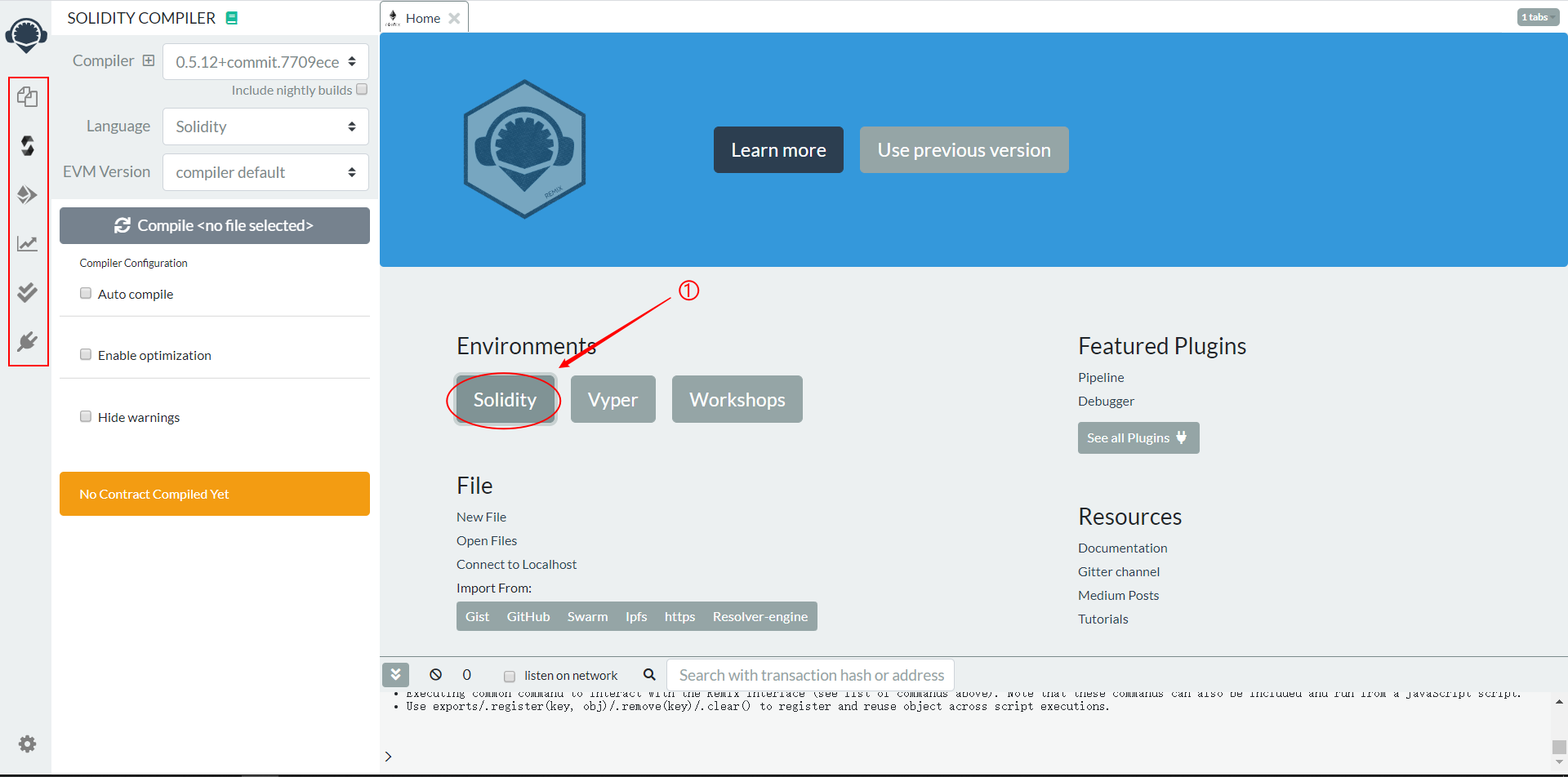
先新建一个sol文件,名字叫什么都可以。
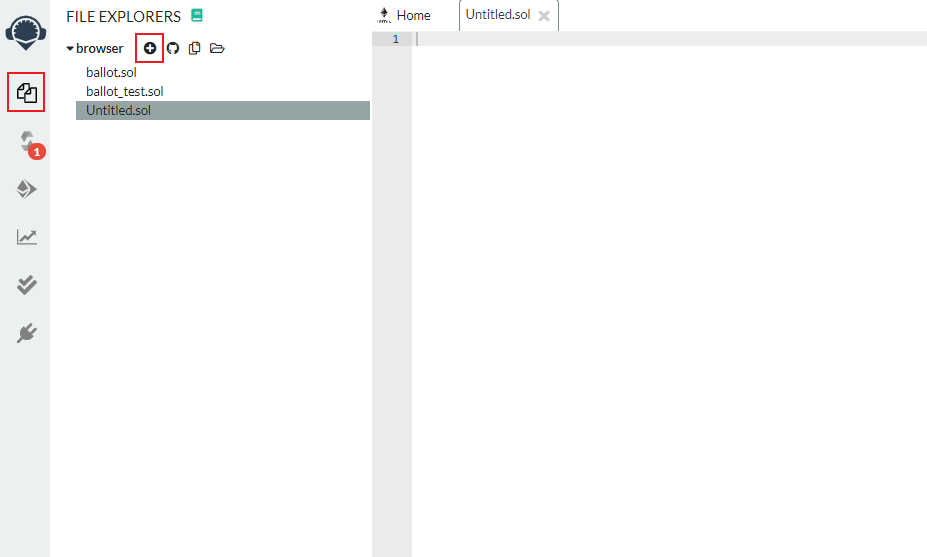
从头开始写一个合约对于我们来说还太过困难,所以我们找一个现成的模板,那么最常见的合约自然就是代币的合约了。
发行属于自己的代币
我发行的代币LZH的合约地址是0xe34c6bf29e43edc9d4c7bc06cb3ba79638185149,因为我已经公开了代码所以大家可以直接在etherscan里找到我的代码,不过由于需要翻墙,所以我直接把代码放出来(我也放在了GitHub上,也可以从上面下)。
/**
*Submitted for verification at Etherscan.io on 2017-12-26
*/
pragma solidity ^0.4.18;
/**
* This smart contract code is Copyright 2017 Bitmart. For more information see https://www.bitmart.com
*
* Licensed under the Apache License, version 2.0
*/
/**
* @title SafeMath
* @dev Math operations with safety checks that revert() on error
*/
library SafeMath {
function mul(uint256 a, uint256 b) internal pure returns (uint256) {
if (a == 0) {
return 0;
}
uint256 c = a * b;
assert(c / a == b);
return c;
}
function div(uint256 a, uint256 b) internal pure returns (uint256) {
// assert(b > 0); // Solidity automatically revert()s when dividing by 0
uint256 c = a / b;
// assert(a == b * c + a % b); // There is no case in which this doesn't hold
return c;
}
function sub(uint256 a, uint256 b) internal pure returns (uint256) {
assert(b <= a);
return a - b;
}
function add(uint256 a, uint256 b) internal pure returns (uint256) {
uint256 c = a + b;
assert(c >= a);
return c;
}
}
/*
* LZH //从这里开始把所有的LZH换成你的代币
*
* Abstract contract that create Bitmart Token based on ERC20.
*
*/
contract LZH { //这里是第一个
using SafeMath for uint256;
string public name;
string public symbol;
uint8 public decimals;
uint256 public totalSupply;
address public owner;
/* This creates an array with all balances */
mapping (address => uint256) public balanceOf;
mapping (address => uint256) public freezeOf;
mapping (address => mapping (address => uint256)) public allowance;
/* This generates a public event on the blockchain that will notify clients */
event Transfer(address indexed from, address indexed to, uint256 value);
/* This notifies clients about the amount burnt */
event Burn(address indexed from, uint256 value);
/* This notifies clients about the amount frozen */
event Freeze(address indexed from, uint256 value);
/* This notifies clients about the amount unfrozen */
event Unfreeze(address indexed from, uint256 value);
/* This notifies the owner transfer */
event OwnershipTransferred(address indexed previousOwner, address indexed newOwner);
/* Initializes contract with initial supply tokens to the creator of the contract */ //下面这个函数里总共有三个
function LZH( uint256 initialSupply, uint8 decimalUnits) public {
balanceOf[msg.sender] = initialSupply; // Give the creator all initial tokens
totalSupply = initialSupply; // Update total supply
name = "LZHToken"; // Set the name for display purposes
symbol = "LZH"; // Set the symbol for display purposes
decimals = decimalUnits; // Amount of decimals for display purposes
owner = msg.sender;
}
/**
* @dev Throws if called by any account other than the owner.
*/
modifier onlyOwner() {
require(msg.sender == owner);
_;
}
/**
* @dev Allows the current owner to transfer control of the contract to a newOwner.
* @param newOwner The address to transfer ownership to.
*/
function transferOwnership(address newOwner) public onlyOwner {
require(newOwner != address(0));
OwnershipTransferred(owner, newOwner);
owner = newOwner;
}
/* Send Coins */
function transfer(address _to, uint256 _value) public {
require(_to != 0x0);
require(_value > 0);
require(balanceOf[msg.sender] >= _value );// Check if the sender has enough
require(balanceOf[_to] + _value >= balanceOf[_to]); // Check for overflows
balanceOf[msg.sender] = balanceOf[msg.sender].sub(_value); // Subtract from the sender
balanceOf[_to] = balanceOf[_to].add(_value); // Add the same to the recipient
Transfer(msg.sender, _to, _value); // Notify anyone listening that this transfer took place
}
/* Allow another contract to spend some tokens in your behalf */
function approve(address _spender, uint256 _value) public returns (bool) {
require(_value > 0);
allowance[msg.sender][_spender] = _value;
return true;
}
/* A contract attempts to get the coins */
function transferFrom(address _from, address _to, uint256 _value) public returns (bool) {
require(_to != 0x0);
require(_value > 0);
require(balanceOf[_from] >= _value );// Check if the sender has enough
require(balanceOf[_to] + _value >= balanceOf[_to]); // Check for overflows
require(_value <= allowance[_from][msg.sender]); // Check allowance
balanceOf[_from] = balanceOf[_from].sub(_value); // Subtract from the sender
balanceOf[_to] = balanceOf[_to].add(_value); // Add the same to the recipient
allowance[_from][msg.sender] = allowance[_from][msg.sender].sub(_value);
Transfer(_from, _to, _value);
return true;
}
function burn(uint256 _value) public onlyOwner returns (bool) {
require(balanceOf[msg.sender] >= _value);// Check if the sender has enough
require(_value > 0);
balanceOf[msg.sender] = balanceOf[msg.sender].sub(_value); // Subtract from the sender
totalSupply = totalSupply.sub(_value); // Updates totalSupply
Burn(msg.sender, _value);
return true;
}
function freeze(uint256 _value) public returns (bool) {
require(balanceOf[msg.sender] >= _value);// Check if the sender has enough
require(_value > 0);
balanceOf[msg.sender] = balanceOf[msg.sender].sub(_value); // Subtract from the sender
freezeOf[msg.sender] = freezeOf[msg.sender].add(_value); // Updates totalSupply
Freeze(msg.sender, _value);
return true;
}
function unfreeze(uint256 _value) public returns (bool) {
require(freezeOf[msg.sender] >= _value); // Check if the sender has enough
require(_value > 0);
freezeOf[msg.sender] = freezeOf[msg.sender].sub(_value); // Subtract from the sender
balanceOf[msg.sender] = balanceOf[msg.sender].add(_value);
Unfreeze(msg.sender, _value);
return true;
}
// transfer contract balance to owner
function withdrawEther(uint256 amount) public onlyOwner {
owner.transfer(amount);
}
// can accept ether
function() payable public {
}
}首先我们先编译一下,看看有没有问题。
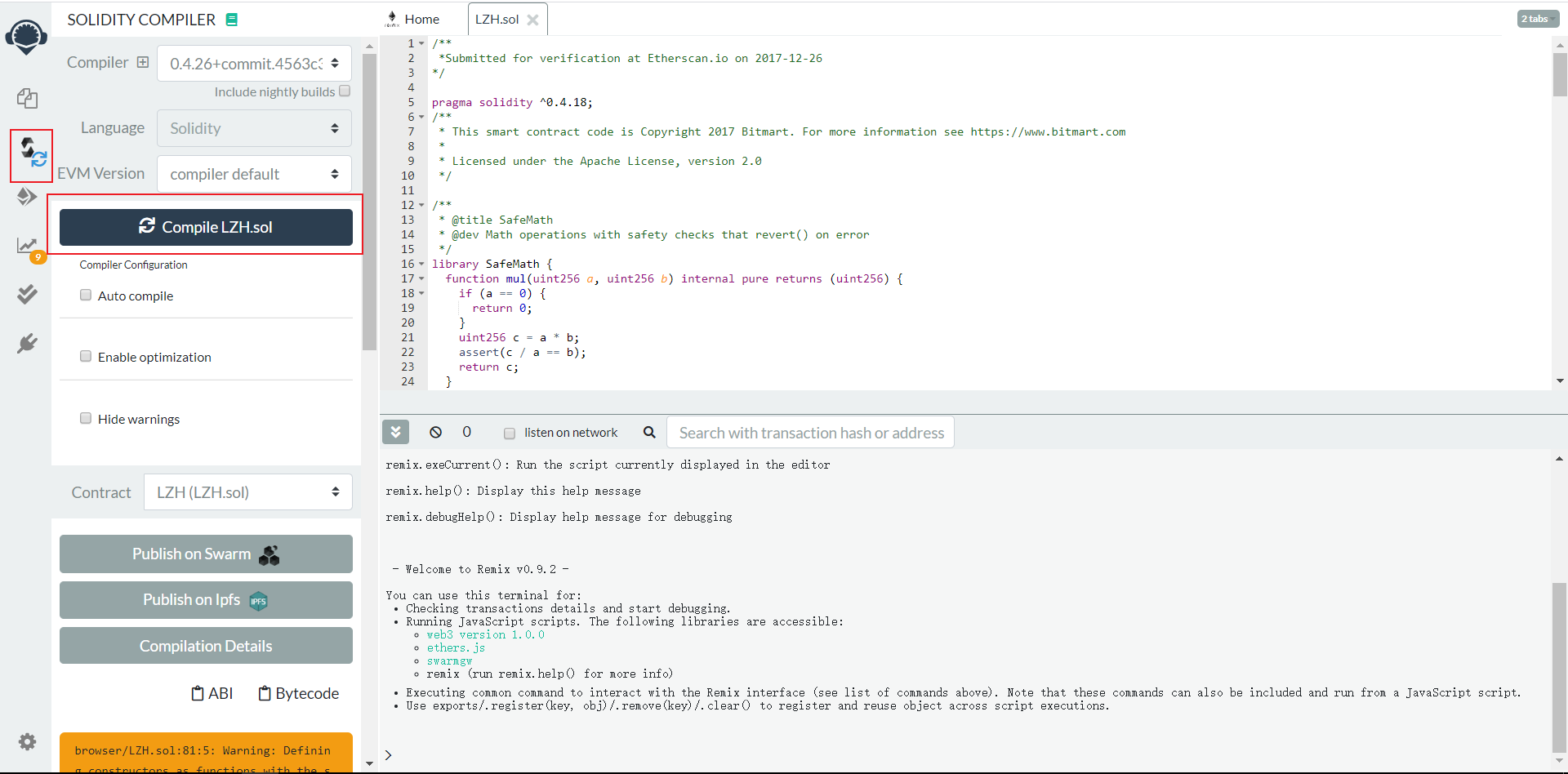
然后选择好你要发行的代币数量,你的代币就成功发行了。
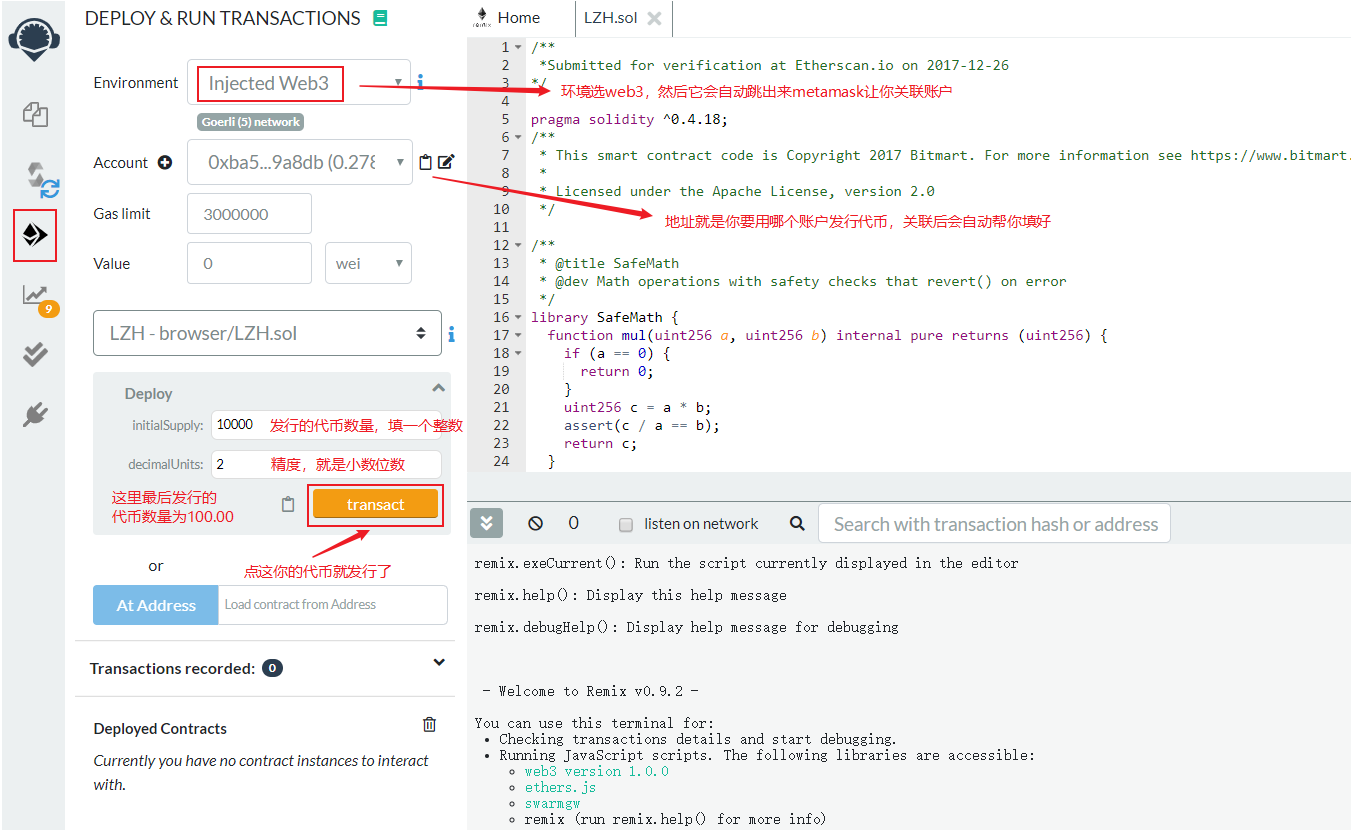
代码公开
你可以选择公开你的合约代码,这样别人可以参考你的合约,也可以帮你寻找漏洞。在发行完后会返回一个地址,这是你创建合约这一交易的地址,你可以从中找到你的合约的地址(需要翻墙)。

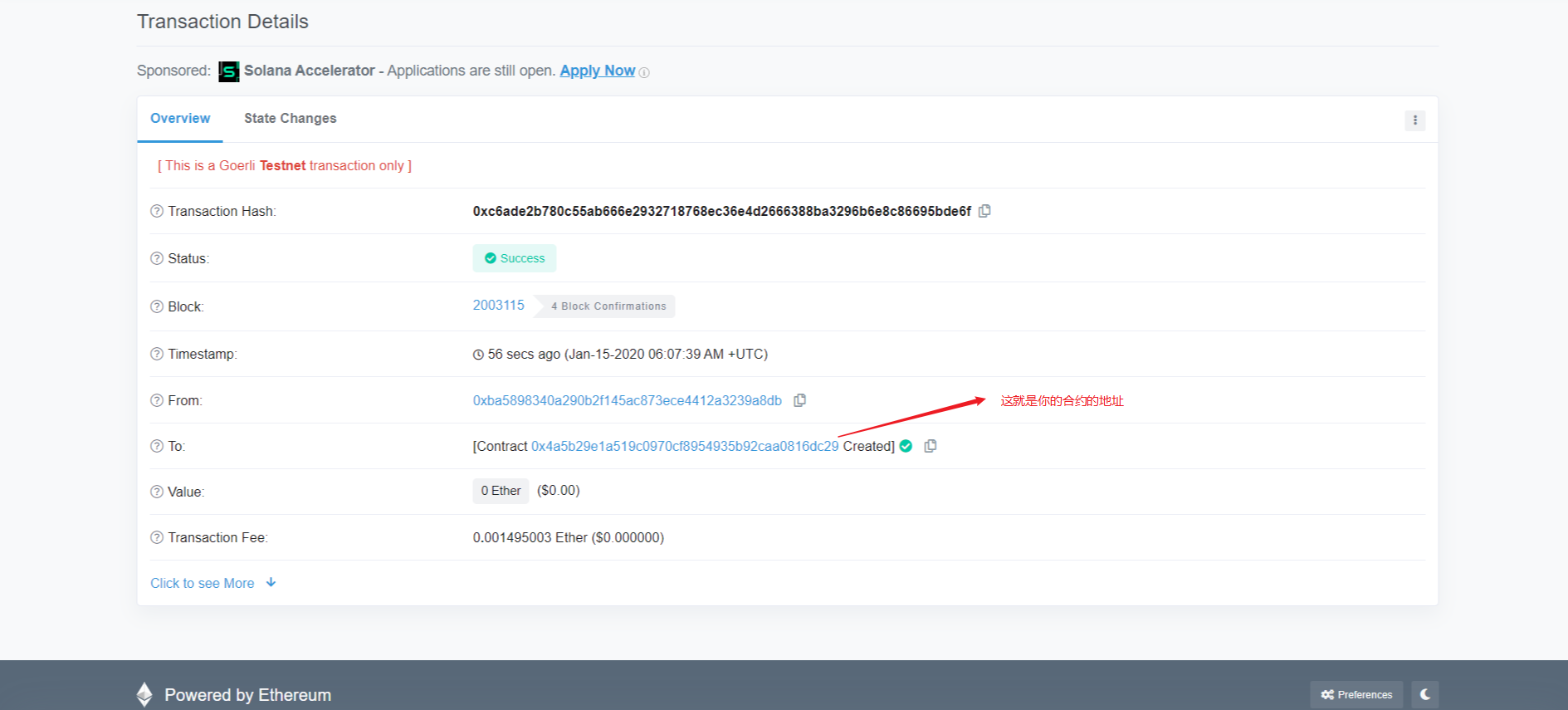
你可以在这里看到合约的代码,如果已经公开了的话
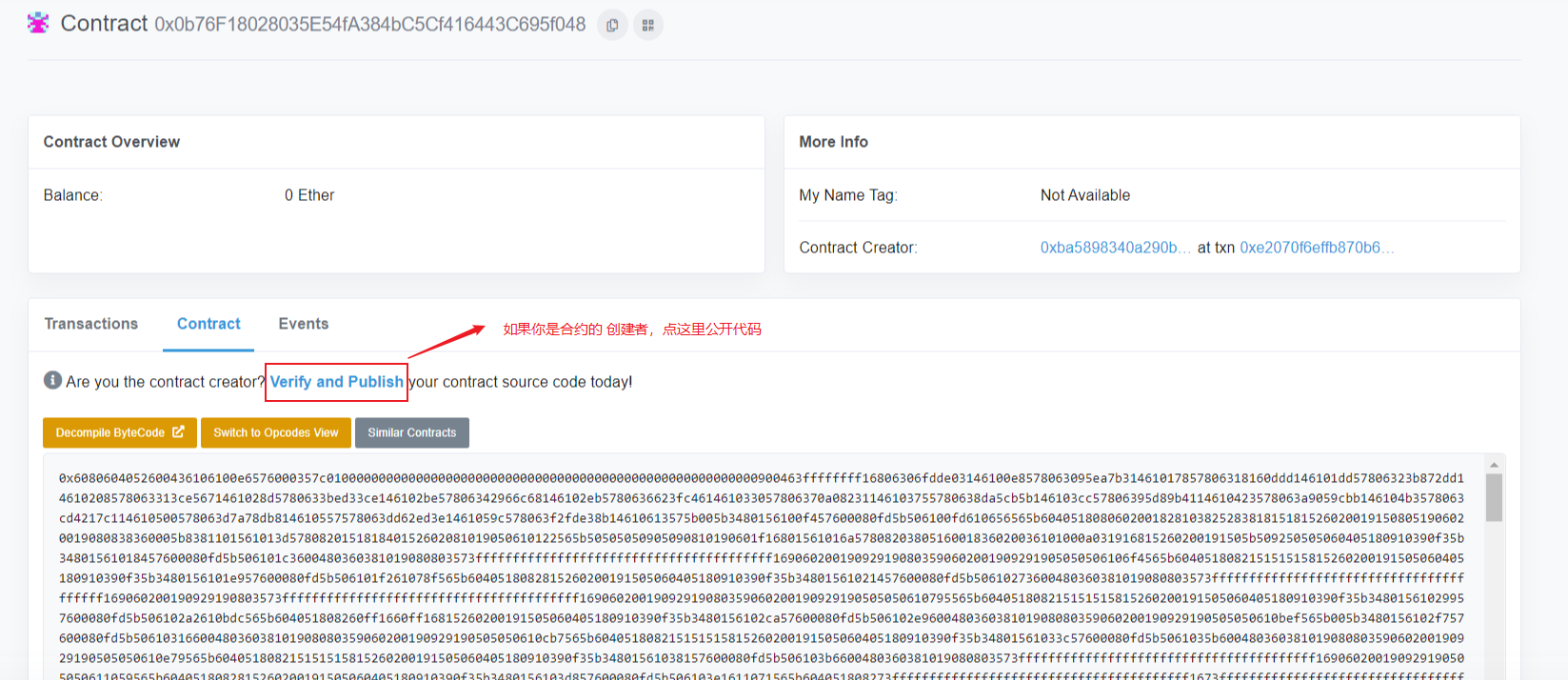
公开代码需要证明你是合约创建人
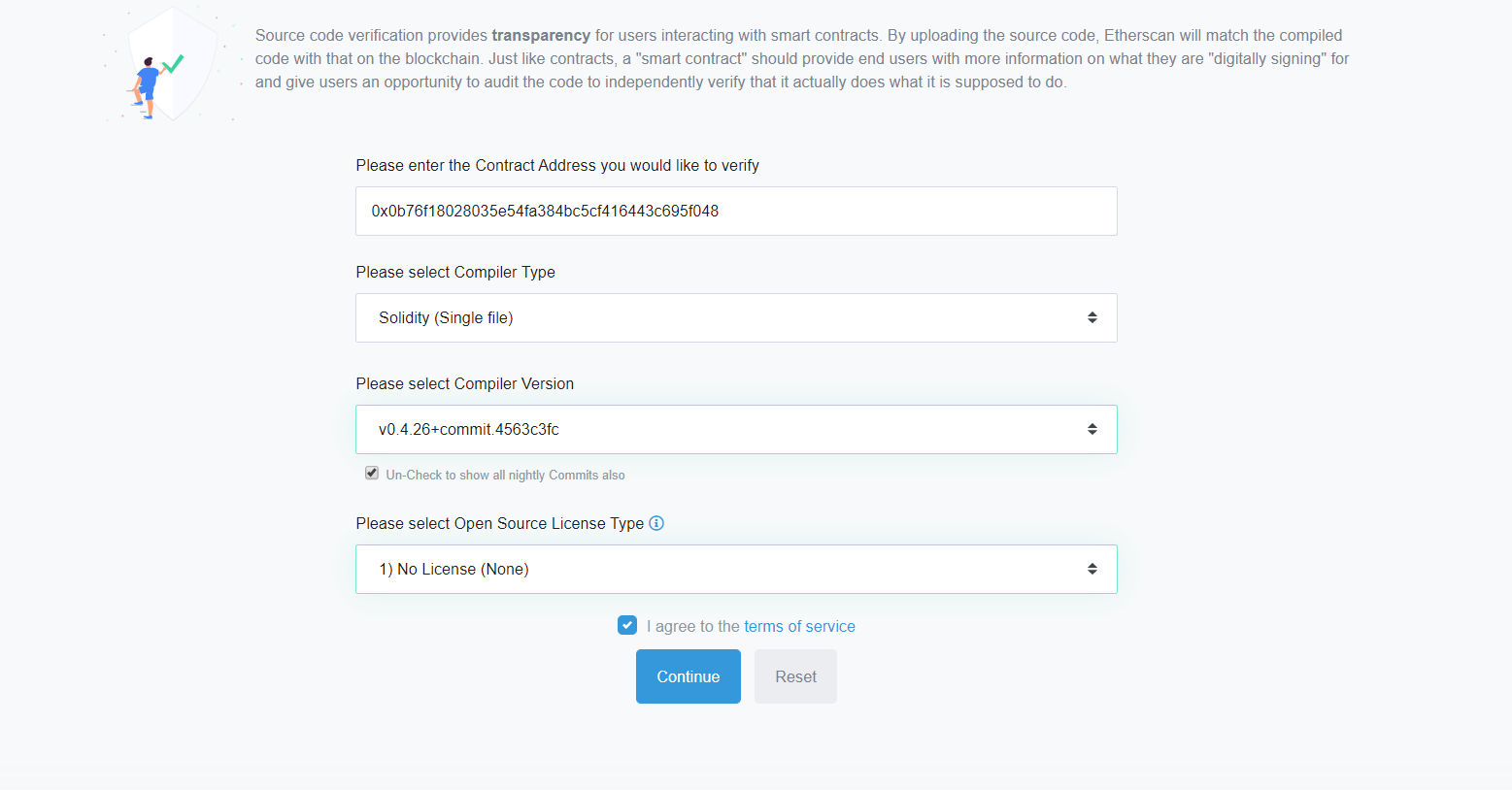
最后把代码粘贴上去即可,不过有时候可能会莫名报错,可以多试几次。
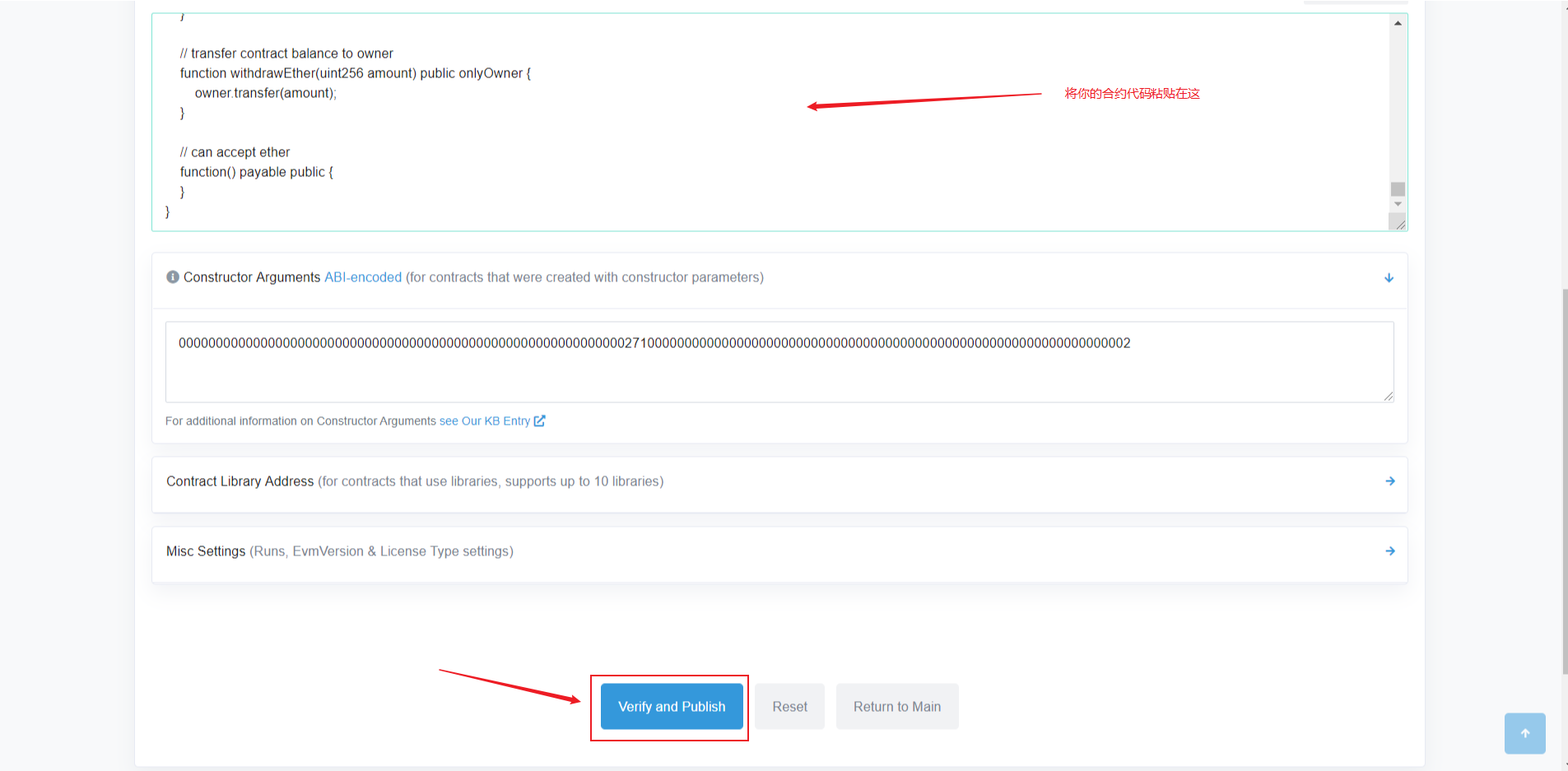
再回到之前的页面,你可以看到Contract旁边多了个绿色的小圆点,说明你的代码已经公开了,所有人都可以在这看到。
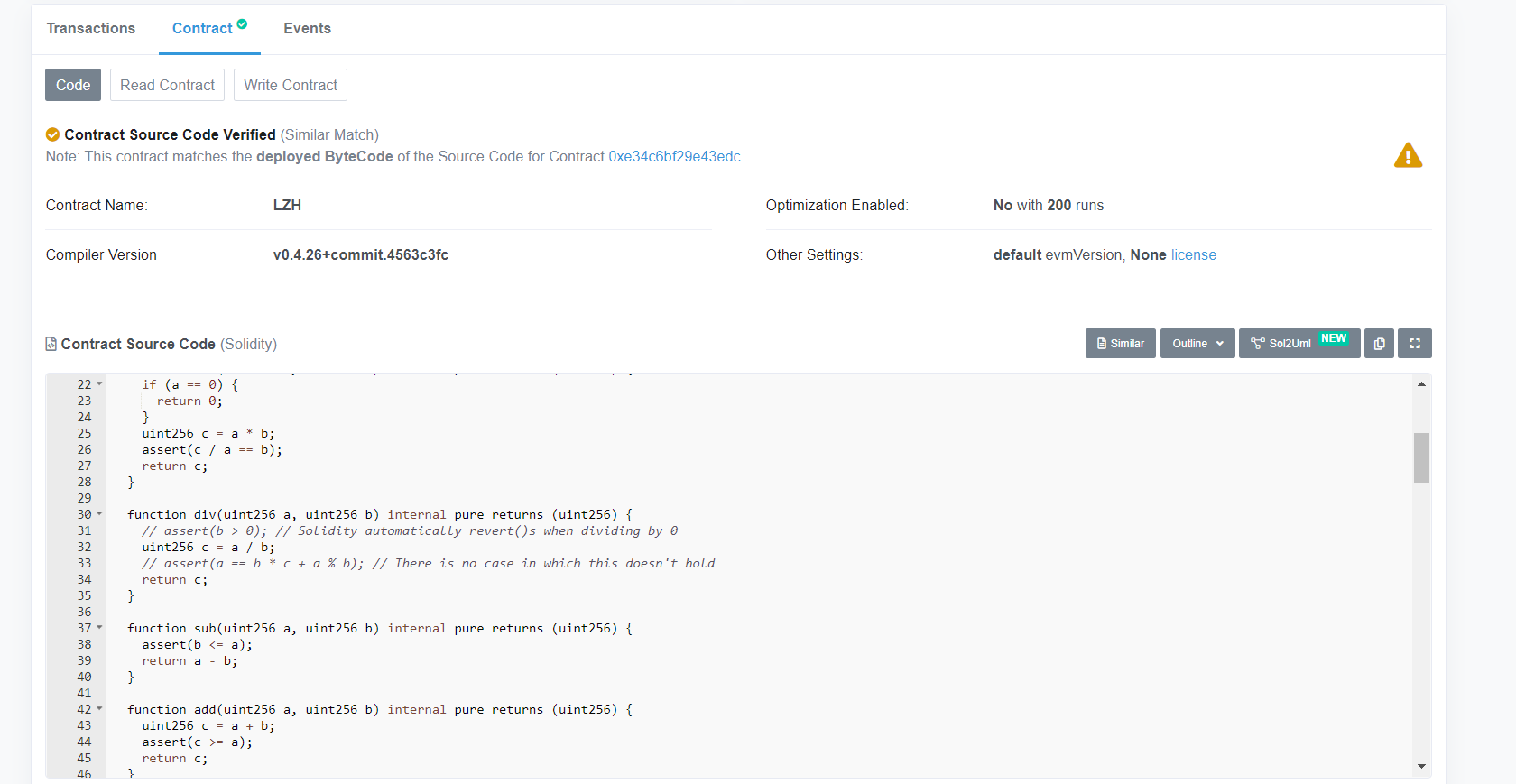
函数的调用
回到编辑器那,点击左下角,我们可以看到合约中包含的函数,我们可以直接在这里通过可视化的界面调用它们。
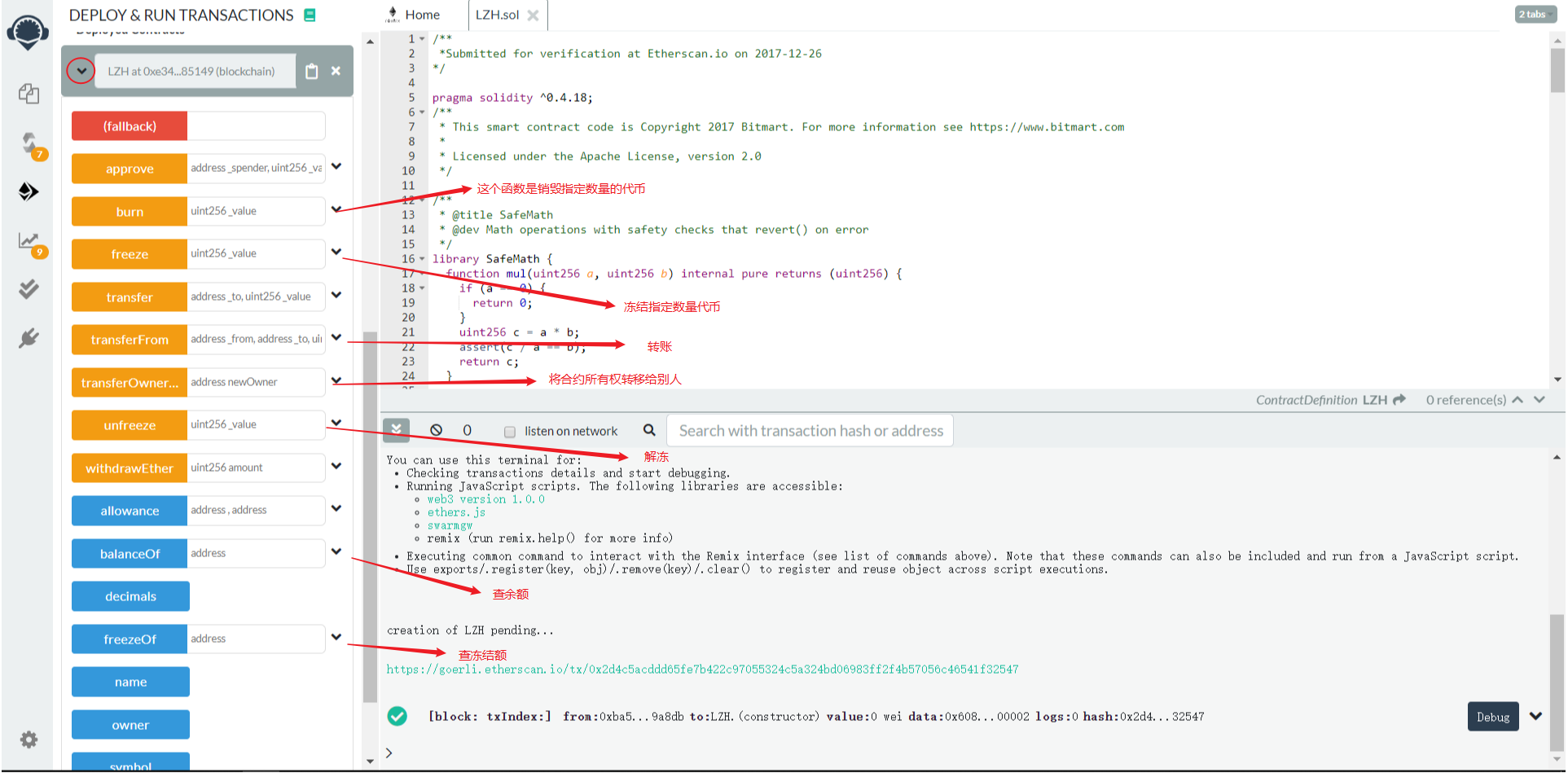






 OωO
OωO

